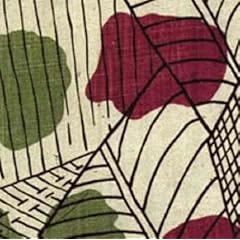
Leonard Woolf is one of those forgotten novelists whom small presses sneak back into print from time to time. He is remembered as the husband of Virginia Woolf and as her diligent nurse during long, frequent bouts of bipolar disorder; a member of the Bloomsbury group; the publisher of the Hogarth Press; an editor of political journals; and the author of five volumes of autobiography that covered the years 1888-1969.
But he also wrote two novels - and gave up after The Wise Virgins was published and ignored in 1914.
But new interest in Leonard Woolf has been sparked in recent years - perhaps by the fascination with Virginia. Two editions of Leonard Woolf’s lovely neglected second novel, The Wise Virgins, have been reissued: one by Persephone in 2003, with a preface by biographer Lyndall Gordon; and a second by Yale University Press in 2007, with a foreword by Leonard Woolf's biographer Victoria Glendinning.

Endpapers for the Persephone edition
I, of course, have neither: mine is a 1979 Harcourt Brace Jovanovich edition, with an introduction by Ian Parsons, an editor who was the husband of Leonard's longtime lover, Trekkie Parsons, an illustrator.
Parsons admired the novel. He wrote:
“The Wise Virgins is a roman a clef, and like most novels that make use of real characters and events in disguise, it gave offense to those who thought they recognized themselves in its pages.”
It seems that Leonard’s mother was particularly upset by his portrayal of her as the character, Mrs. Davis, a whiny Jewish woman obsessed with "the servant problem." And though Leonard is not exactly like Harry Davis, the moody son and depressed artist, his love affair with Camilla Lawrence mirrors Leonard's affair with Virginia. Camilla (Virginia) is a charming, sparkling young woman who spins whimsical stories about other students in the art class. Katherine Lawrence is Vanessa Bell; Clive Bell appears, and so do other members of the Bloomsbury group.
Virginia did not read The Wise Virgins till 1915: Parsons says Leonard may not have shown it to her until her recovery from a third bout of mental illness. Leonard, who also suffered from depression, never allowed the novel to be reprinted in his lifetime, and some believe it is because it damaged his relationship with his mother.
It is slow but charming. Woolf has a gift for depicting the slowness of time in these different days.
He also has a strong, unerring sense of comedy. In the opening pages he wittily yet sympathetically describes the Garland family:
“Mrs. Garland was not strictly a virgin, but she was a widow with four virgin daughters, and a widow of so many years’ standing that she might almost have been said to have reached a second virginity.”
The Garland "virgins" range in age from 24-37; it does not seem they have much chance of marrying. Gwen, the youngest, struggles against her fate. And when the Davises move in next door, she is secretly excited by the thought of Harry. But then he depresses her with his bleak, cyncial attitudes.
Woolf also has a strong visual sense. He paints tableaux of the Garland women in the garden embroidering, reading, and conversing about the vacuity of novels; entertaining new neighbors with desultory conversation and tea; Harry’s conversations with fellow art students; the dull red villas in the suburbs; and middle-class vacations in August.
The novel is charming, not always well-written, but I have a feeling that it is going to end with a punch.
Good Sunday night reading.
2 comments:
His Village novel is dark and powerful, original and brave. He really does show the horrors of human beings got together in traditional structures, where there is no education, only forms of religion exacerbated by angry and despair and desires for vengeance. The court cases are the products of spite, envy and a subsidence economy.
In a way this novel is more important and relevant to us today than VWoolf's. But no one would pay attention, so he returned to his essays and political endeavours to improve the world.
At the end of his life he said all he had done had been of no use whasoever and when I look at the feebleness of the UN today and how a dire economic situation has been created by 30 years of US government reactionary groups, I understand his despair.
Ellen
The Wise Virgins is a very unhappy, almost brutal novel. It's not at all what I expected after the intitial tea scenes.
I'd like to read the Village novel, if I can find it.
Very sad - all he did - that he would feel that way at the end.
Post a Comment